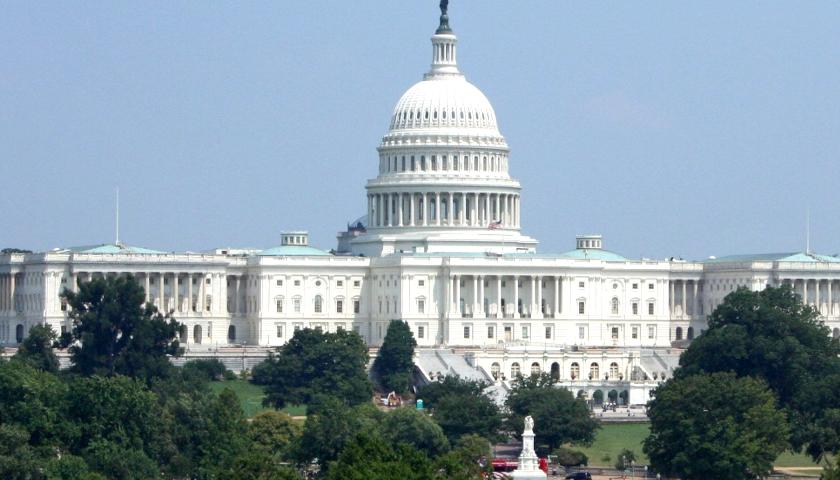by Andrew Trunsky
The Senate on Tuesday passed its bipartisan infrastructure bill, moving what would be the largest public works package in decades one step closer to becoming law months after negotiations first began.
The bill, which advocates praised as the largest investment in America’s infrastructure since the construction of the interstate highway system in the 1950s, passed 69-30. Nineteen Republicans joined every Democrat in voting for the package.
The legislation, titled the Infrastructure Investment and Jobs Act (IIJA), was on a glide path to passage after beating a Senate filibuster Sunday night, when 68 senators voted to end debate.
 Arizona Sen. Kyrsten Sinema, the bill’s lead Democratic negotiator, said Monday on the Senate floor that the bill would “make America stronger and safer, create good-paying jobs and expand economic opportunities across the country,” and praised her colleagues for their commitment to reaching an agreement. “This is what it looks like when elected leaders take a step toward healing our country’s divisions rather than feeding [them],” she added.
Arizona Sen. Kyrsten Sinema, the bill’s lead Democratic negotiator, said Monday on the Senate floor that the bill would “make America stronger and safer, create good-paying jobs and expand economic opportunities across the country,” and praised her colleagues for their commitment to reaching an agreement. “This is what it looks like when elected leaders take a step toward healing our country’s divisions rather than feeding [them],” she added.
The IIJA costs $1.2 trillion over eight years, $550 billion of which is new government spending, and puts hundreds of billions of federal dollars toward roads, bridges, ports, broadband and more. It was led by Ohio Sen. Rob Portman on the Republican side, and was the product of negotiations among 22 senators and President Joe Biden.
“[This is] landmark and needed legislation in fixing our roads, railroads, our ports, electrical grid and more,” Portman said on the floor. “I’m proud of what was done on that … It will improve the lives of all Americans. It’s long-term spending to repair and replace and build assets that will last for decades.”
Talks first began with West Virginia Republican Sen. Shelley Moore Capito, but collapsed after she and the White House could not agree on the overall size and scope of the bill. Negotiations then shifted to the bipartisan group, but remained precarious for weeks as they struggled to compromise on how to finance the new spending and what it should cover.
It was late July when Portman announced that the group had reached agreement on the “major issues,” and that Republicans were ready to move forward.
The bill cleared its first procedural vote hours later with the support of 17 Republicans, including Senate Majority Leader Mitch McConnell, a clear indication that it had the necessary support to beat a filibuster and pass. Two days later, 16 Republicans joined Democrats in officially voting to begin debate.
Senators originally sought to pass the bill last week or over the weekend, but were blocked from doing so by Tennessee Republican Sen. Bill Hagerty, who refused to forgo hours of scheduled debate. He cited the Congressional Budget Office’s estimate that the bill would add $256 billion to the deficit over the next 10 years, arguing that the legislation was not fully paid for, unlike what its negotiators previously said.
Hagerty’s delays earned praise from former President Donald Trump on Sunday, who had repeatedly tried to intimidate Republicans into opposing the package. In multiple email statements he disparaged McConnell for supporting the bill, calling it a “disgrace” and the “beginning of the Green New Deal,” and floated backing primary challengers against other Republicans who backed it.
With the IIJA’s passing, senators are now set to take up their budget resolution, keeping them in Washington for another marathon session with dozens of politically tricky amendment votes and eating into their prized August recess. The mammoth resolution, unveiled by Vermont Independent Sen. Bernie Sanders on Monday, addresses priorities omitted from the infrastructure bill including health care, climate change and immigration and as outlined costs $3.5 trillion.
“This legislation in so many ways begins to address the working families of our country,” Sanders said on the Senate floor Monday. “But in one important way, maybe the most important, is as we address the needs of our people in health care and education and climate, we are going to create many millions of good-paying jobs that the American people desperately need.”
While Republicans unanimously oppose the reconciliation package, Senate rules allow for Democrats to pass it with just a simple majority vote, meaning that it could pass strictly along party lines if their caucus all votes for it.
McConnell on Tuesday accused Democrats of playing “Russian roulette with our country” and said the budget would be the “largest peacetime tax hike on record.”
“This new reckless taxing and spending spree will fall like a hammer blow on workers and middle-class families,” McConnell said. “If all 50 Democrats want to help [Budget Committee] Chairman Sanders hurt middle-class families … well, that’s their prerogative, but we’re going to argue it out right here on the floor at some length.”
Several progressives, however, have sought to tie the bipartisan bill with the reconciliation package, with some in the House hinging their support for the former on Senate Democrats passing the latter. In an attempt to hold her narrow majority together, House Speaker Nancy Pelosi has said that she will not bring the bipartisan bill up for a vote until the Senate passes the reconciliation package as well, despite moderates urging her to bring up the infrastructure package as soon as possible.
Others have also been critical of the infrastructure bill, which was adopted as a substitute for the $715 billion surface transportation bill that the House passed in July, arguing that it inadequately invests in climate, housing, child care and more.
Oregon Democratic Rep. Peter DeFazio, the chair of the House Transportation Committee, reportedly called the bill “crap” after a deal was reached, lamenting the fact that it omitted large swaths of the transportation bill he authored and disregarding the White House’s endorsement of it.
“I could give a damn about the White House. We’re an independent branch of government,” he told reporters in July. “They cut this deal. I didn’t sign off on it.”
– – –
Andrew Trunsky is a reporter at Daily Caller News Foundation.





